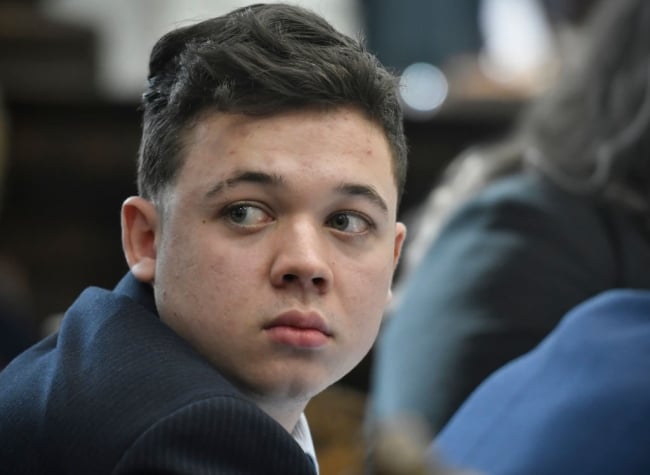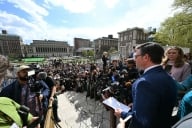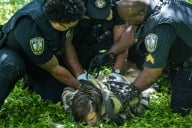You have /5 articles left.
Sign up for a free account or log in.

Rittenhouse, pictured here in court in Kenosha in 2021, is currently halfway through a series of four lectures at U.S. universities.
Sean Krajacic / Getty Images
When Kyle Rittenhouse came to speak at the University of Memphis last week, protesters filled the venue, booing and shouting at him as he took the stage.
Rittenhouse, best known for killing two people during unrest concerning police brutality in Kenosha, Wisconsin, when he was 17, was sponsored by the conservative organization Turning Point USA (TPUSA); Memphis was the second stop on a four-campus circuit.
His talk, entitled “The Rittenhouse Recap,” centers on “themes related to individual rights, self-defense, and the importance of upholding the rule of law,” Turning Point spokesperson Aubrey Laitsch told Inside Higher Ed in an email.
One video of the March 20 event in Memphis shows an audience member asking Rittenhouse about racist statements made by Charlie Kirk, Turning Point USA’s founder.
“What racist things has Charlie Kirk said?” Rittenhouse asked, to cries of disbelief from the crowd. “We’re going to have a little bit of a dialogue. What racist things has Charlie Kirk said?”
“OK, I’ll answer the question,” the audience member said. “He’s said we shouldn’t celebrate Juneteenth, we shouldn’t celebrate Martin Luther King Day, we should be working those days. He’s called Ketanji Brown Jackson an affirmative action hire, he’s said all this nonsense about George Floyd, and he’s said he’d be scared if a Black pilot was on a plane. Does that not seem racist?”
“I don’t know anything about that,” Rittenhouse said.
The questioner then asked if such comments constitute hate speech. Rittenhouse declined to answer, prompting more jeers from the crowd.
After the exchange, another person appears to start walking onto stage, but the video cuts off as he walks toward Rittenhouse. According to Richard Massey, a Memphis student who attended the talk to protest, the individual said something inaudible to Rittenhouse, who then walked off stage, ending the lecture.
“Once he was pressed by a student and asked about the vulgar remarks by Charlie Kirk … Rittenhouse abruptly left,” Massey said. “It’s clear he wasn’t prepared for the backlash.”
But Laitsch disputed that account, claiming that Rittenhouse was able to speak for his entire allotted 30-minute time, then held a private Q&A with members of Memphis’s TPUSA chapter.
Even before the talk, there was controversy over ticket distribution; Turning Point initially dispersed the tickets, but shortly before the event they were all invalidated and had to be reordered through the university’s ticketing service. Explanations for why vary by source; according to an article by the local news affiliate ABC24, a university spokesperson attributed the decision to concerns about Turning Point’s ticketing service.
The University of Memphis did not respond to Inside Higher Ed’s request for comment.
“Definitely Provocation”
According to Turning Point, Rittenhouse’s talks do not comprise an official tour; rather, members of TPUSA chapters at four colleges reached out and invited him to campus in conjunction with the release of his book, Acquitted, which came out last fall.
Rittenhouse, who was acquitted of all five homicide and reckless endangerment charges on the grounds that he acted in self-defense, is a highly controversial figure. Many on the right see him as a hero who defended himself from a “violent mob,” while critics view him as emblematic of white vigilante violence against people of color and their allies. His campus appearances have inspired backlash from students who argue not only that he makes their campuses less safe for student of color, but also that he brings nothing valuable to an academic setting.
“There’s nothing scholarly … about him,” said Massey, who objected to Rittenhouse coming to speak in a majority-Black city that is still reckoning with the aftereffects of the 2023 death of Tyre Nichols, a Black FedEx employee, who was severely beaten by police.
Rittenhouse isn’t the only polarizing figure Turning Point has brought to college campuses. Listed among the speakers on the TPUSA website are conservative personalities such as Tomi Lahren, Ben Shapiro, Ann Coulter and Jordan Peterson—all of whom have held talks on college campuses that were disrupted by protesters.
Some believe the organization purposefully uses polarizing speakers—and the campus protests they inevitably incite—to further widen the divide between the left and the right.
“[TPUSA’s] space within the field of college activism is definitely provocation,” said Jeffrey Kidder, a professor of sociology at Northern Illinois University and the co-author of The Channels of Student Activism: How the Left and Right are Winning (and Losing) in Campus Politics Today (The University of Chicago Press, 2022). “This is a group that, several years ago, had stickers that said things like ‘socialism sucks’ that are meant to be catchy and in your face and at least a little bit offensive, if not very offensive … the cycle of outrage continues on both sides of the political spectrum.”
Turning Point USA argues that its aim is not to incite anger among liberal students but rather to inspire dialogue.
“Kyle’s experience and perspective offer valuable insights into issues related to self-defense and the justice system, which are relevant topics for college students to explore and discuss. By hosting speakers like him, TPUSA aims to encourage critical thinking and informed debate among students,” Laitsch wrote.
Other Appearances
His inaugural presentation of the “Rittenhouse Recap,” at East Tennessee State University, triggered a demonstration hours before the event, according to the Johnson City Press. Protesters held signs denouncing racism, fascism and violence.
But the event itself went off without interruption, according to TPUSA and local news articles. East Tennessee administrators had told news outlets prior to the talk that student organizations are permitted to invite to campus any guest speaker they want, and that the First Amendment prohibits the university from interfering—unless the event poses a safety risk.
Rittenhouse is slated to appear this Wednesday night at Western Kentucky University, and on April 16 at Kent State University. Neither university responded to requests for comment.
But some Kent State students said they consider it especially insensitive for their campus to host an individual who fatally shot protesters, given that the Ohio National Guard killed four students and injured nine during an anti-war rally there in 1970.
“The parallels to what happened on that August night [in Kenosha] and the fateful events that happened on our own campus are uncanny,” Leah Shepard, a reporter for the university’s newspaper, Kent Wired, wrote in an op-ed.
“This is a slap in the face of everything Kent State has done to memorialize that day. It desecrates the memories of those who gave their lives for peace and progress.”
Another Kent State student, Ally Greco, started a petition against Rittenhouse’s appearance, which now has over 3,300 signatures.
She said that TPUSA’s goal in inviting him is to cause controversy and raise the group’s own profile.
“They do benefit from having this conversation even though it’s negative,” she said. “There’s more eyes on their organization … they’re still getting more people to talk about them.”







